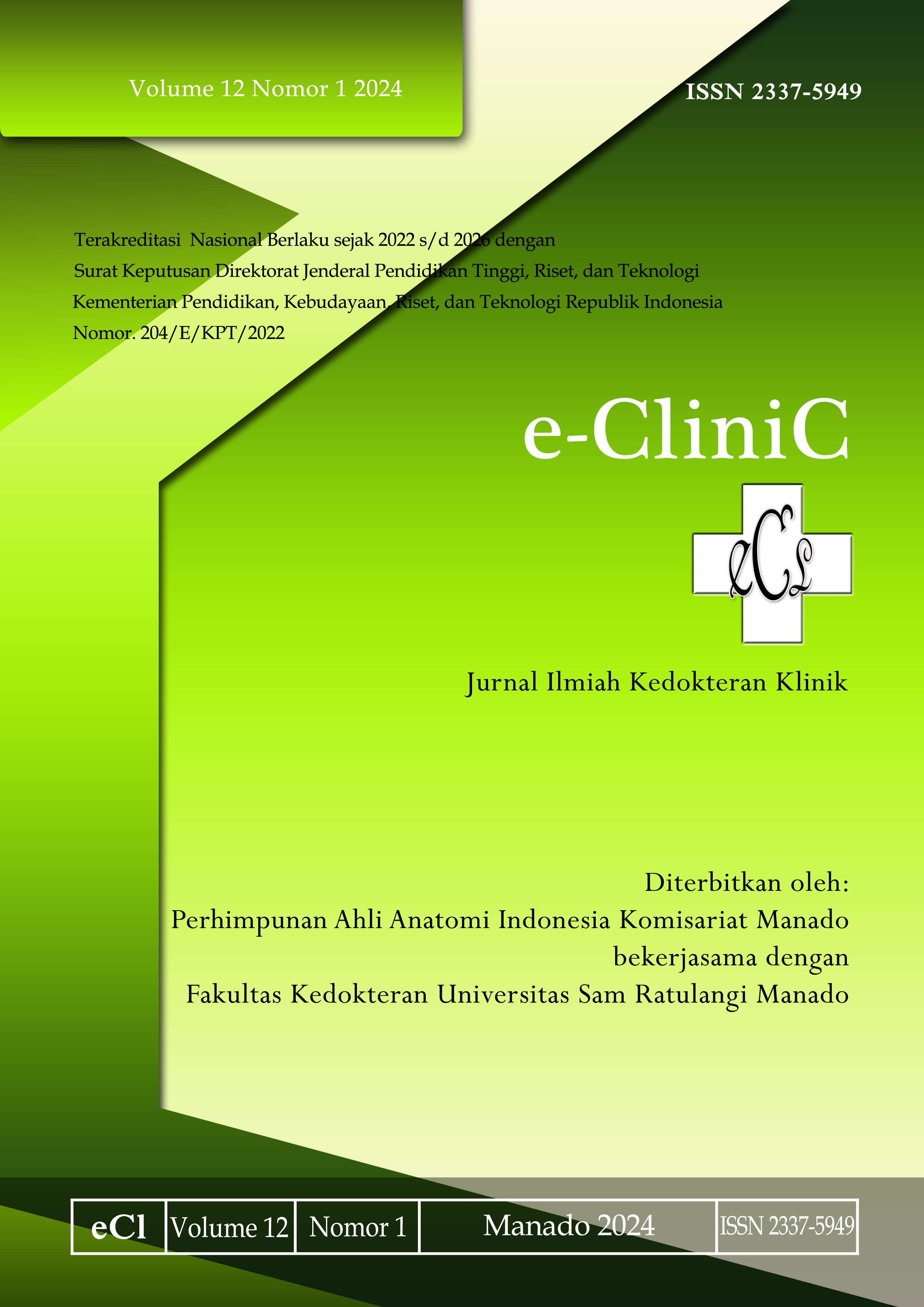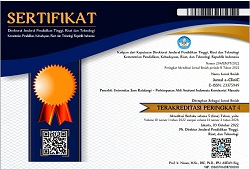Hubungan antara Kebiasan Merokok, Konsumsi Alkohol dan Faktor Sosiodemografis dengan Kualitas Hidup Remaja di Kabupaten Minahasa Utara
DOI:
https://doi.org/10.35790/ecl.v12i1.45748Abstract
Abstract: Quality of life (QoL) is a measure for the health status of an individual comprehensively, assessed based on the physical, psychological, social and environmental domains. Several factors influence the development of adolescents, including social media, urbanization, and unhealthy eating pattern. This study aimed to analyze the relationship between smoking habit, alcohol consumption, and sociodemographic factors with quality of life of adolescents in North Minahasa. This was a quantitative study with a cross-sectional design. Respondents were 402 teenagers who were junior and senior high school students in North Minahasa. Research variables were age, gender, smoking habit, and alcohol consumption. Data were analyzed univariately, bivariately, and multivariately using the chi square test. The results showed that there was no significant relationship between age, gender, alcohol consumption habits and smoking habits with QoL of adolescents (p>0.05). There was a significant relationship between smoking habits and QoL of adolescents (p=0.049). Adolescent smoking habit significantly affected QoL of adolescents, where adolescents who smoked had a probability of 2.374 of having a lower QoL compared to those who did not smoke. In conclusion, there is no significant relationship between age, gender, and alcohol consumption habit with the QoL of adolescents, however, there is a significant relationship between smoking habits and the QoL of adolescents in North Minahasa.
Keywords: age; gender; smoking; alcohol consumption; quality of life; adolescents
Abstrak: Kualitas hidup merupakan suatu ukuran terhadap status kesehatan individu secara komprehensif yang dinilai berdasarkan domain fisik, psikologis, sosial dan lingkungan. Terdapat beberapa faktor yang memengaruhi perkembangan remaja, antara lain media sosial, urbanisasi, pola makan yang tidak sehat. Penelitian ini bertujuan untuk menganalisis hubungan antara kebiasaan merokok, konsumsi alkohol dan faktor sosiodemografi dengan kualitas hidup remaja di Minahasa Utara. Jenis penelitian ialah kuantitatif dengan desain potong lintang. Responden penelitian ialah 402 remaja yang merupakan siswa SMP dan SMA di Minahasa Utara. Variabel penelitian yaitu usia, jenis kelamin, kebiasaan merokok, konsuksi alkohol dan kualitas hidup remaja. Data penelitian dianalisis secara univariat, bivariat dan multivatriat dengan menggunakan uji chi square. Hasil penelitian memunjukkan tidak terdapat hubungan bermakna antara usia, jenis kelamin, kebiasaan konsumsi alcohol, dan kebiasaan merokok dengan kualitas hidup remaja (p>0,05). Terdapat hubungan bermakna antara kebiasaan merokok dengan kualitas hidup remaja (p=0,049). Remaja merokok memiliki kemungkinan sebesar 2,374 dengan kualitas hidup rendah dibandingkan remaja tidak merokok. Simpulan penelitian ini ialah tidak terdapat hubungan bermakna antara usia, jenis kelamin, kebiasaan konsumsi alkohol dengan kualitas hidup remaja namun terdapat hubungan bermakna antara kebiasaan merokok dengan kualitas hidup remaja di Kabupaten Minahasa Utara.
Kata kunci: usia; jenis kelamin; merokok; konsumsi alkohol; kualitas hidup; remaja
References
World Health Organization. 2021. Adolescent health (online). Available from: https://www.who.int/health-topics/adolescent-health#tab=tab_1
Hamilton BE, Martin JA, Osterman MJK, Driscoll AK, Rossen LM. Vital statistics rapid release. Natl Vital Stat Rep. 2019;70(2):1-51.
Johnston LD, Miech RA, O'Malley PM, Bachman JG, Schulenberg JE, Patrick ME. Monitoring the future national survey results on drug use, 1975-2018: overview, key findings on adolescent drug use. Institute for Social Research; 2019.
Ethier KA, Kann L, McManus T. Sexual intercourse among high school students—29 states and United States 0verall, 2005– 2015. Morbidity and Mortality Weekly Report. 2018;66(51-52):1393-97. Doi: 10.15585/mmwr.mm665152a1.
Whoqol Group. The World Health Organization quality of life assessment (WHOQOL): position paper from the WHO. Social Science & Medicine. 1995;41(10):1403-9. Doi: 10.1016/0277-9536(95)00112-k
UNICEF. Adolescent and well being. 2022. Available from: https://www.unicef.org/health/adolescent-health-and-well-being
GSHS. Perilaku Berisiko Kesehatan Pada Siswa SMP dan SMA di Indonesia. Puslitbang Upaya Kesehatan Masyarakat. Jakarta: Badan Litbangkes Kementrian Kesehatan RI; 2015.
Kementerian Menteri Kesehatan Republik Indonesia. Perilaku Merokok Masyarakat Indonesia. Jakarta: Kementrian Kesehatan RI; 2015.
Haryono RHS, Kurniasari K. Stres akademis berhubungan dengan kualitas hidup pada remaja. Jurnal Biomedika dan Kesehatan. 2018;1(1):75-84. Doi: https://doi.org/10.18051/JBiomedKes.2018.v1.75-84.
Owu SJ. Hubungan antara perilaku merokok dan konsumsi alkohol dengan kualitas hidup remaja di Kabupaten Minahasa Tenggara [Tesis]. Manado: Universitas Sam Ratulangi; 2022.
Porajow ZCJG, Manampiring AE, Wariki WMV, Palandeng HMF, Langi FFLG. Hubungan kualitas hidup kesehatan dengan aktifitas fisik dan statuts gizi remaja Kota Manado di era pandemi COVID-19. Jurnal Biomedik. 2021;13(03):358-67. Available from: https://doi.org/10.35790/jbm.v13i3.34417.
Buleno I, Nelwan JE, Runtuwene J, Manampiring AE, Ratag G. Kualitas hidup remaja di Kotamobagu Sulawesi Utara pada masa pandemi coronavirus disease 2019. Health Care. 2021;10(2):262-7. Available from: https://doi.org/10.36763/healthcare.v10i2.160.
Kalesaran AFC, Kandou GD. Hubungan merokok dan pendidikan dengan kualitas hidup pada laki-laki dewasa di Desa Tatelu Kecamatan Dimembe Kabupaten Minahasa Utara. KESMAS. 2017;6(3):1-6.
Karimi M, Brazier J. Health, health-related quality of life, and quality of life: what is the difference? Pharmacoeconomics. 2016;34(7):645–9. Doi: 10.1007/s40273-016-0389-9.
Lam CLK. Subjective quality of life measures general principles and concepts. In: Preedy VR, Watson RR, editors. Handbook of Disease Burdens and Quality of Life Measures. New York: Springers; 2010. p. 381-99.
MacKillop E, Sheard S. Quantifying life: understanding the history of quality-adjusted life-years (QALYs). Social Science & Medicine. 2018;211:359–66. Doi: 10.1016/j.socscimed.2018.07.004.
Tulenan M, Rompas S, dan Ismanto AY. Hubungan perilaku merokok dengan prestasi belajar pada remaja perokok di SMA Negeri 1 Remboken. eJurnal Keperawatan Unsrat. 2015;3(2):1-7.
Aditari LD, Ranakusuma OI, Karimulloh. Hubungan antara lingkungan perokok, persepsi manfaat merokok, jumlah batang rokok dan kualitas hidup terkait kesehatan pada remaja perokok serta tinjauannya dalam Islam [Doctoral dissertation]. Jakarta: Universitas YARSI; 2019.
Heikkinen H, Jallinoja P, Saarni SI, Patja K. The impact of smoking on health-related and overall quality of life: a general population survey in Finland. Nicotine & Tobacco Research (N&TR). 2008;10(7):1199-207. Doi: 10.1080/14622200802163142.
Hays RD, Reeve BB. Measurement and modeling of health-related quality of life. International Encyclopedia of Public Health. San Diego: Academic Press; 2008. p. 241-52. Doi: 10.1016/B978-012373960-5.00336-1.
Baiju RM, Peter E, Varghese NO, Sivaram, R. Oral health and quality of life: current concepts. J Clin Diagn Res. 2017;11(6), ZE21-26. Doi: 10.7860/JCDR/2017/25866.10110.
Apfelbacher CJ, Jones C, Hankins M, Smith H. Validity of two common asthma-specific quality of life questionnaires: Juniper mini asthma quality of life questionnaire and Sydney asthma quality of life questionnaire. Health Qual Life Outcomes. 2012;20(10):97. Doi: 10.1186/1477-7525-10-97.
Spilková J, Dzúrová D. The quality of life and risk behavior of teenagers in the mirror of the ESPAD data. Procedia-social and behavioral sciences, 2012;35:237-44. Doi: https://doi.org/10.1016/j.sbspro.2012.02.084.
Ferrans CE, Zerwic JJ, Wilbur JE, Larson JL. Conceptual model of health‐related quality of life. Journal of Nursing Scholarship. 2005;37(4):336-42. Doi: 10.1111/j.1547-5069.2005.00058.x
Peterson SJ, Bredow TS. Middle Range Theories: Aplication Nursing Research. United States of America: Lippincott Williams & Wilkins; 2004.
Setyowati R. Hubungan jenis kelamin dengan kualitas hidup pasien dengan penyakit kronis. Jurnal Kampus STIKes YPIB Majalengka. 2020;8(2):141-9.
Chintya P, Sekeon SA, Kalesaran AF. Hubungan status merokok dan konsumsi alkohol dengan kualitas hidup penduduk di Desa Tambun Kepulauan Talise Kecamatan Likupang Barat Kabupaten Minahasa Utara. KESMAS. 2018;7(5).
Sonjaya KH, Engkeng S, Munayang H. Hubungan antara pengetahuan dan sikap dengan aktivitas merokok pelajar SMA Negeri 1 Airmadidi Kabupaten Minahasa Utara. KESMAS, 2019;8(4):43-9.
Waworundeng CB, Rattu AJM, Mandagi CKF. Faktor–faktor yang berhubungan dengan perilaku merokok pada remaja di Desa Gangga Satu Kabupaten Minahasa Utara. KESMAS. 2019;8(7):115-20.
Losa J, Tasik F, Purwanto A. Peranan orang tua dalam mengatasi kenakalan remaja akibat meminum alkhohol Cap Tikus (Studi Kasus di Desa Talawaan Kecamatan Talawaan Kabupaten Minahasa Utara). Jurnal Administrasi Publik. 2016;1(43). Available from: https://ejournal.unsrat.ac.id/v3/ index.php/ JAP/article/view/17063
Kalengkongan C, Ratag BT, Kalesaran AFC. Hubungan antara konsumsi alkohol dengan gangguan fungsi kognitif pada masyarakat Desa Tambun Kec. Likupang Barat. KESMAS. 2018;7(3).
Pantow JM. Hubungan antara perilaku berisiko dan kualitas tidur dengan kualitas hidup remaja di Kabupaten Minahasa Tenggara [Tesis]. Manado: Universitas Sam Ratulangi; 2022.
Pennacchini M, Bertolaso M, Elvira MM, De Marinis, MG. A brief history of the quality of life: its use in medicine and in philosophy. Clin Ter. 2011;162(3):e99–e103.
Haraldstad K, Wahl A, Andenæs R, Andersen JR, Andersen MH, Beisland E, et al. A systematic review of quality of life research in medicine and health sciences. Qual Life Res. 2019;28(10):2641–50. Doi: 10.1007/s11136-019-02214-9.
McDowell I. Measuring Health: A Guide to Rating Scales and Questionnaires (Third ed.). Oxford: Oxford University Press; 2006.
Hamka M, Hos HJ, Tawulo MA. Perilaku seks bebas di kalangan remaja (Studi di Kecamatan Maligano Kabupaten Muna Sulawesi Tenggara). Jurnal Neo Societal. 2016;1:58-69. Doi: http://dx.doi.org/10.52423/jns.v1i1.9519.
Foster JH, Powell JE, Marshall EJ, Peters TJ. Quality of life in alcohol-dependent subjects–a review. Qual Life Res. 1999;8(3):255-61. Doi: 10.1023/a:1008802711478.
Ojelabi AO, Graham Y, Haighton C, Ling J. A systematic review of the application of Wilson and Cleary health-related quality of life model in chronic diseases. Health Qual Life Outcomes. 2017;15(241):1-15. Doi: 10.1186/s12955-017-0818-2.
Post MWM. Definitions of Quality of Life: What Has Happened and How to Move On. Top Spinal Cord Inj Rehabil. 2014;20(3):167-80. Doi:10.1310/sci2003-167
Srivastava S, Bhatia MS. Quality of life as an outcome measure in the treatment of alcohol dependence. Industrial psychiatry journal. 2013;22(1):41-46. Doi: 10.4103/0972-6748.123617
CDC. Health-related quality of life and well being. Health People Mid Course Review 2020. Available from: https://www.cdc.gov/nchs/data/hpdata2020/HP2020MCR-C18-HRQOL-WB.pdf.
Tillmann M, Silcock J. A comparison of smokers' and ex-smokers' health-related quality of life. Journal of Public Health. 1997;19(3): 268-73. Doi: 10.1093/oxfordjournals.pubmed.a024629.
Cui Y, Forget EL, Torabi M, Oguzoglu U, Ohinmaa A, Zhu Y. Health-related quality of life and economic burden to smoking behaviour among Canadians. Can J Public Health. 2019;110(5):533-41. Doi: 10.17269/s41997-019-00244-x.
Theofilou P. Quality of life: definition and measurement. Europe’s Journal of Psychology. 2013;9(1):150-62. Doi: 10.5964/ejop.v9i1.337.
Unsal A, Ayranci U, Tozun M. Frequency of smoking among males and its impact on the quality of life. Pak J Med Sci. 2010;26(1):163-7.
Wessberg P, Frennered K. Central lumbar spinal stenosis: natural history of non-surgical patients. Eur Spine J. 2017;26(10):2536– 42. Doi: 10.1007/s00586-017-5075-x
World Health Organization. 2004. Indonesian WHOQoL (online). Available from: https://cdn.who.int/media/ docs/default-source/publishing-policies/whoqol-bref/indonesian-whoqol-bref.zip?sfvrsn=41334f5e_2
World Health Organization. 2021. Recognizing adolescence. [cited 2021 Oct 12]. Available from: https://apps.who.int/adolescent/second-decade/section2/page1/recognizing-adolescence.html
Kementerian Menteri Kesehatan Republik Indonesia. Peraturan Menteri Kesehatan Republik Indonesia Nomor 28 Tahun 2013 tentang Pencantuman Peringatan Kesehatan Dan Informasi Kesehatan Pada Kemasan Produk Tembakau. Jakarta: Kemenkes RI; 2013.
World Health Organization. Substance Abuse Department, World Health Organization. Department of Mental Health, Substance Abuse, and World Health Organization. 2014) Global status report: alcohol policy. Available from: https://www.afro.who.int/sites/default/files/2017-06/msb_gsr_2014_1.pdf
Cheng X, Jin C. The association between smoking and health- related quality of life among Chinese individuals aged 40 years and older: a cross-sectional study. Frontiers in Public Health, 2022;10(779789):1-7. Doi: 10.3389/fpubh.2022.779789.
Downloads
Published
How to Cite
Issue
Section
License
Copyright (c) 2023 Anthoneta S. Pinaria, Aaltje E. Manampiring, Adrian Umboh

This work is licensed under a Creative Commons Attribution-NonCommercial 4.0 International License.
COPYRIGHT
Authors who publish with this journal agree to the following terms:
Authors hold their copyright and grant this journal the privilege of first publication, with the work simultaneously licensed under a Creative Commons Attribution License that permits others to impart the work with an acknowledgment of the work's origin and initial publication by this journal.
Authors can enter into separate or additional contractual arrangements for the non-exclusive distribution of the journal's published version of the work (for example, post it to an institutional repository or publish it in a book), with an acknowledgment of its underlying publication in this journal.
Authors are permitted and encouraged to post their work online (for example, in institutional repositories or on their website) as it can lead to productive exchanges, as well as earlier and greater citation of the published work (See The Effect of Open Access).







